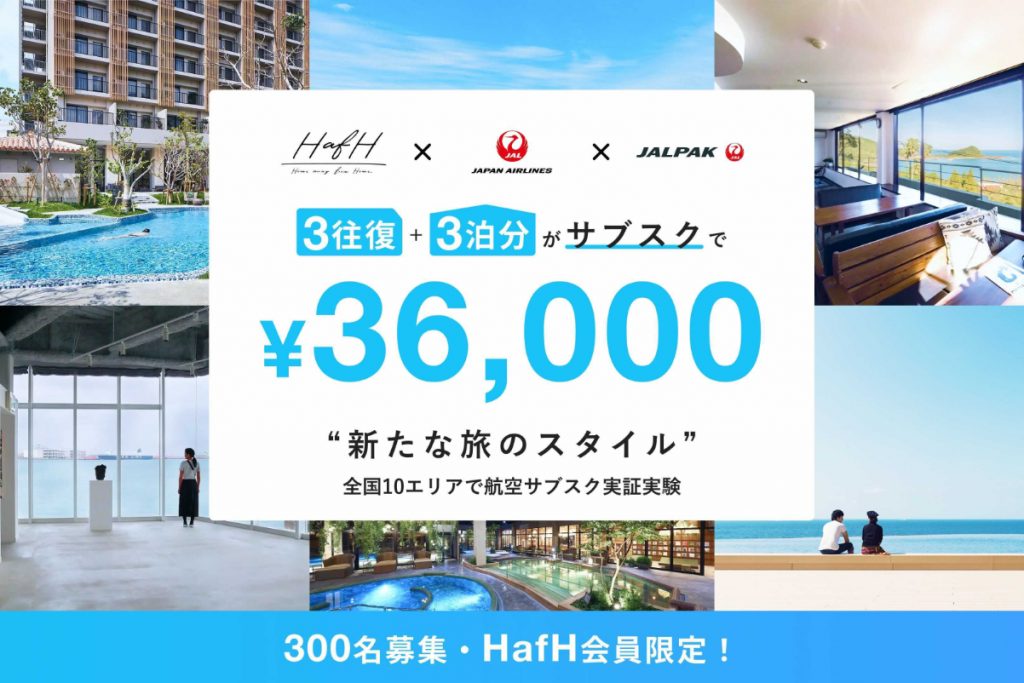Skift Take
Japanese startup Kabuk Style has thousands of travelers booking hotels and guesthouses via subscription. A recent promotion with the airline JAL boosted the company's profile.
A year before the pandemic struck, Kabuk Style launched a subscription service. The Nagasaki-based startup lets travelers pay a recurring fee to get access to stays at 1,000 hotels and ryokans (guesthouses). Once domestic travel resumed, sales of the HafH (Home away from Home) product rebounded — thanks to a rise in remote workers.
“It’s very profitable,” said Kenji Sunada, founder and CEO of Kabuk Style.
Between August and November 2021, Japan Airlines (JAL) began a three-month promotion. It made non-refundable flight tickets available in a discounted wholesale deal to HafH users booking trips.
About 500 travelers bought flights-and-lodging packages, with half saying they were on “workcations,” mixing business with leisure. About 80 percent said they visited a destination they hadn’t planned to visit before signing up. The startup said it’s now finalizing the next proof-of-concept with JAL.

JR West, part of the Japan Railways Group, participated in the company’s Series A round of funding through a corporate venture capital arm. The startup has raised $15.2 million, mostly pure equity, as of April, Sunada said. Other investors include Headline.
HafH is of many subscription products from travel companies such as CitizenM, Selina, and Inspirato. Recurring payments remain tantalizing to brands as an alternative to one-off transactions. But it’s tricky to get a subscription right.
“The price of a subscription is fixed, but the prices of accommodations and flights on the open market are dynamic and volatile,” Sunada said.
Sunada, who previously worked in the equity and capital markets department at Deutsche Securities, helped base his company’s pricing mechanism on lessons from how the financial markets set prices for trading derivatives.
“A booking is like a financial option in that it buys you the right to stay at a place at a set price for weeks later,” Sunada said.
The startup handles pricing volatility in supply by giving subscribers “coins” — a currency it controls, similar to points in a loyalty program. Customers pay for travel with a mix of coins and cash.
About 3,500 people have provided HafH with their payment card and signed up to pay a monthly fee of approximately $75 (10,000 yen), which gets converted into coins. They pay for stays with coins. Users are incentivized to renew their subscriptions with bonus coins.
Hotels like the model, Sunada said. The startup’s use of coins is a form of opaque pricing. It prevents comparisons with rates the hotels offer elsewhere online. Tripadvisor’s subscription-based discount booking program ran into a problem with hoteliers when consumers began comparing rates.
Kabuk Style also gets hotel and flight inventory at wholesale rates, which it resells via subscriptions.
An unspecified number of the 3,500 users have hit “snooze” on their plan so as not to pay or travel for a while.
“Just 30 percent of people book travel within their first month of subscribing,” said co-founder Ryo Osera. “Many see it as kind of like a savings plan and source of inspiration.”
A larger audience of past and potential customers bolsters the brand’s monthly active users to about 10,000, Osera said.
Before the pandemic, about 10 percent of the startup’s subscribers were based outside of Japan. They’re now all Japanese. But the company has been hiring in recent months to expand its business in Taiwan and South Korea, with future plans to target places like Singapore, Thailand, and Hawaii, as the pandemic restrictions lift.
Right now, hotels have to sign up and join manually. But the startup aims to create an API, or application programming interface, to speed up the process of onboarding inventory.
Word of mouth and social media marketing have been key for the startup.
“We’re creating a community where people find other people interested in traveling while working remotely or doing workcations, which are relatively new in Japan and other parts of Asia,” Osera said. “The social aspect has been powerful.”
UPDATE: This article originally said about 30 percent of the startup’s subscribers were based outside of Japan. The correct figure is 10 percent. Subscribers also pay for hotel stays only with coins, rather than coins and cash.
Have a confidential tip for Skift? Get in touch
Tags: jal, japan, kabuk, loyalty, subscriptions
Photo credit: An external shot of Onsen Ryokan Yuen Sapporo, a UDS hotel property that's one of the lodgings available recently for stays via the Hahf travel subscription program from the startup Kabuk Style.
